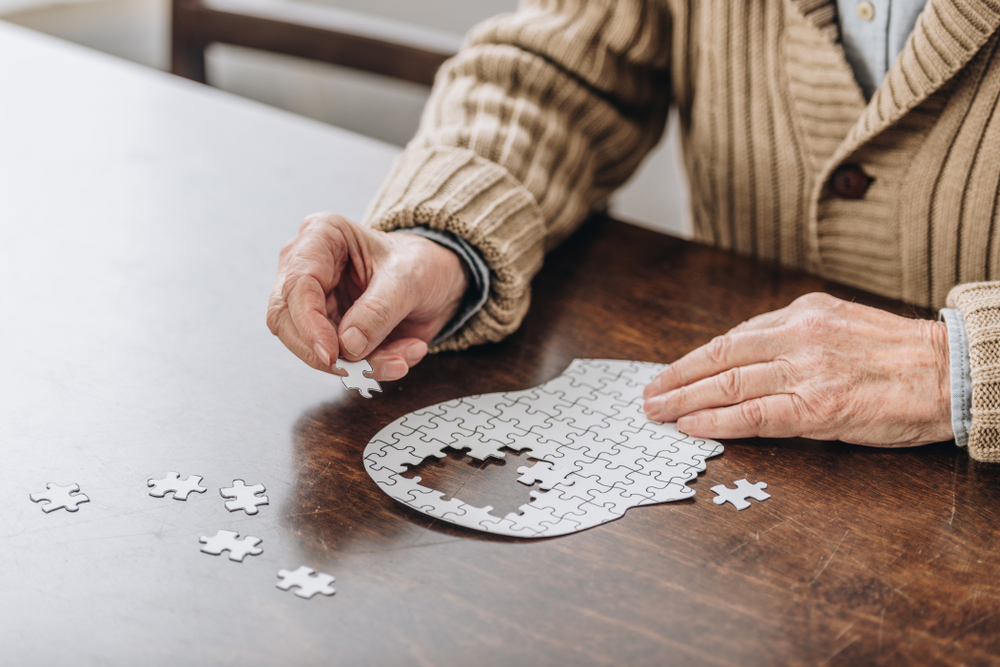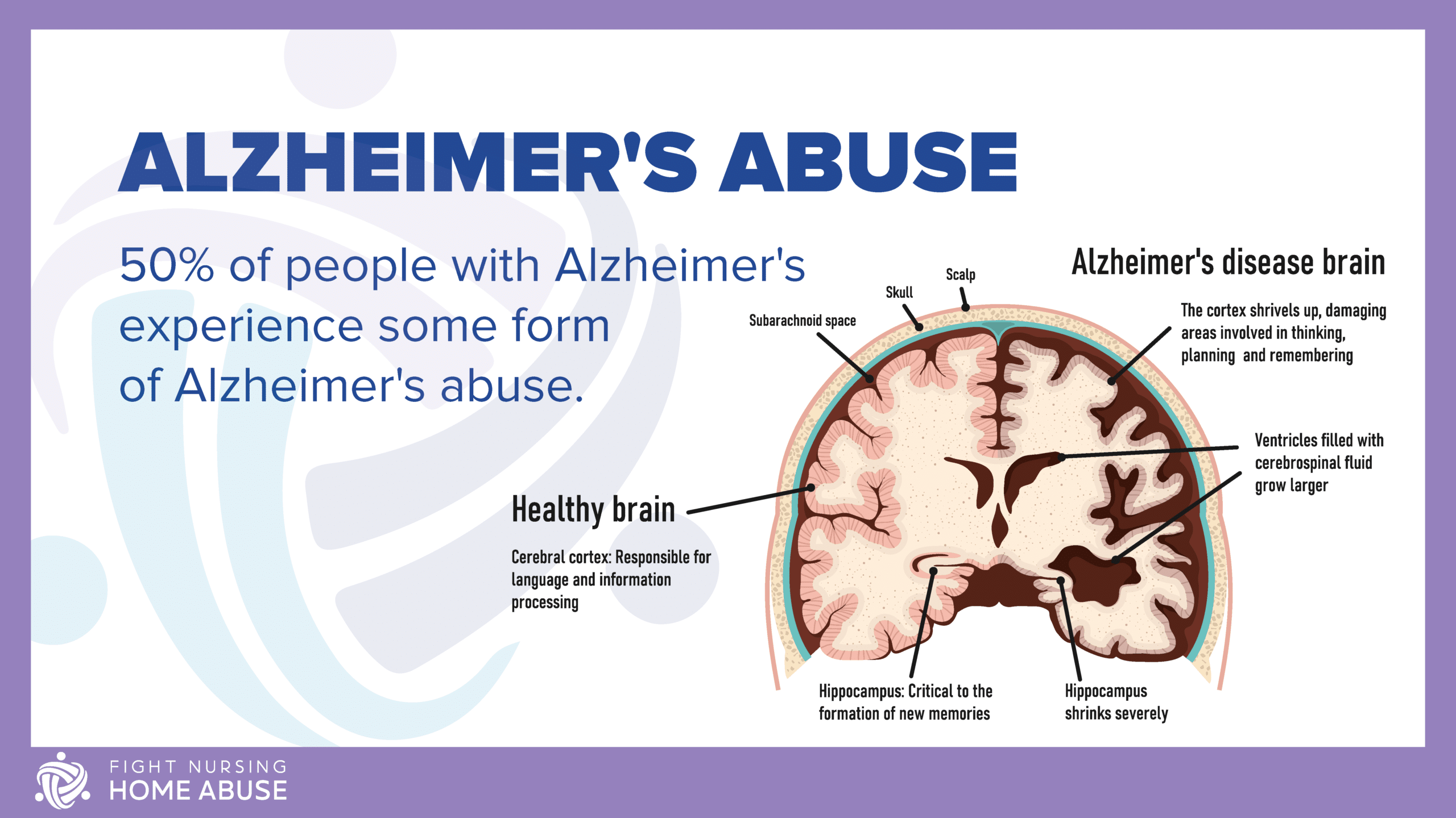Alzheimer’s Abuse

Nursing home abuse is disturbing on its own, but Alzheimer’s abuse is even worse. When the victim suffers from Alzheimer’s disease, this exploitation is heartbreaking. A 2010 study in the Journal of the American Geriatrics Society found that nearly 50 percent of Alzheimer’s patients experience nursing home abuse or neglect.

What is Alzheimer’s Disease?
Alzheimer’s disease is the most common form of dementia. It accounts for 60 to 80 percent of all dementia cases. This is a progressive, incurable brain disorder that destroys memory, intellectual, social and other mental functions. Alzheimer’s disease often begins with minor symptoms that progress over the course of a few years. Sadly, the mortality rate for Alzheimer’s disease is only four to eight years after diagnosis. However, people who are generally in good health can live up to 20 years or more.
Despite what some people believe, Alzheimer’s disease is not a normal part of getting older. It’s true that the greatest risk factor is age, but not everyone will develop Alzheimer’s. Furthermore, not everyone who develops Alzheimer’s is older. Around 200,000 Americans younger than 65 have what is called early-onset Alzheimer’s.
What are the Symptoms of Alzheimer’s Disease?
The symptoms of Alzheimer’s disease vary depending on the person and the severity of the disorder. The Alzheimer’s Association recommends being aware of these 10 early signs and symptoms:
- Memory loss that is disrupting daily life
- Difficulties in problem-solving or planning
- Difficulty completing routine or familiar tasks
- Easily confuses time or place
- Difficulty understanding visual images or spatial relationships
- New problems with writing or speaking
- Misplacing things or inability to retrace steps
- Poor or decreased judgment
- Withdrawal at work or from social activities
- Unexplained changes in personality or mood
If you notice one or more of these signs, talk to your doctor about the risks of Alzheimer’s disease.
Alzheimer’s Abuse in Nursing Homes
Alzheimer’s abuse can occur anywhere – at home or in a nursing home. This type of abuse includes:
- Physical abuse
- Emotional or psychological abuse
- Neglect
- Confinement
- Sexual abuse
- Financial exploitation
- Self neglect
Nursing home residents with Alzheimer’s are more likely to be abused or neglected for the following reasons:
- They might not remember the incident.
- They may fear retaliation from the caregiver.
- Their report might not be believed.
- They may not be able to speak if they are in the advanced stages of the disease.
A sad reality is that the majority of cases of Alzheimer’s abuse, or elder abuse in general, occur at the hands of people familiar to the victim. Often, this is a family member or caregiver.
What are the Signs of Alzheimer’s Abuse?
Alzheimer’s symptoms include personality changes such as irritability, aggression, paranoia and delusions. Because of this, sometimes a perpetrator will shift accusations of abuse onto the disease. With that in mind, and because Alzheimer’s patients are more at risk for abuse, it is important to know the warning signs of elder abuse or neglect.
Signs of Physical Abuse and Neglect May Include:
- Unexplained or frequent bumps and bruises
- Abrupt weight loss
- Bedrail or restraint injuries or bruises
- Unwashed hair, body or clothes
- Fractures or concussions
- Bedsores
Physical abuse usually leaves the victim with bruises, bumps, fractures or other evidence of harm. Emotional and financial abuse is harder to detect.
Signs of Emotional Abuse in an Alzheimer’s Patient
Emotional abuse is intentional and may include verbal abuse, threats, harassment, humiliation and/or intimidation. The warning signs of emotional abuse in an Alzheimer’s patient usually include:
- Unexplained depression or anxiety
- Sudden withdrawal from normal activities
- Fearful or cowering behavior in front of caregiver
- Signs of agitation such as rocking back and forth, sucking thumbs, or muttering to themselves
- Changes in sleeping or eating
- Intense alertness to noises and other stimuli
- Aggressive behavior
- Violence toward others or self
Family members and friends should be on the lookout for threatening or demeaning language or actions by nursing home staff. Another warning sign is a nursing home or caregiver who will not allow you to visit with your loved one alone.
Indicators of Financial Abuse
Dishonest caregivers know that nursing home residents with Alzheimer’s disease have trouble remembering and reasoning. They count on this faulty memory if they want to cheat or steal. It is recommended that Alzheimer’s patients have a family member, attorney or other trusted individual to look after their finances and handle monthly bills. The warning signs of financial abuse might include:
- Missing cash, jewelry, electronics, antiques, or other valuables
- Unexplained cash or ATM withdrawals
- Suspicious credit card purchases
- Evidence of unpaid or overdue bills
- Refusal to supply care without extra payment
Some abusive caregivers try to have themselves added to the resident’s will. All legal paperwork such as wills and trusts should be in order before the disease progresses. If your loved one has been tricked into changing his or her will, you should not hesitate to consult a nursing home abuse lawyer. A lawyer can tell you if such alterations or additions are legal given your loved one’s state of mind.
How to Protect Nursing Home Residents with Alzheimer’s
If you suspect that a loved one with Alzheimer’s is being abused or neglected, you must protect them. This includes reporting the incident to the facility administrator, your local agency on elder affairs, and law enforcement if the situation is immediate and life-threatening. It is better to err on the side of caution, particularly because the symptoms of Alzheimer’s can make it difficult to spot abuse.
Specially designed long-term care facilities are now more available to seniors with Alzheimer’s. These memory care units are supposed to offer trained nurses and aides who understand the unique challenges of the disease. If you are looking for an Alzheimer’s nursing facility for a loved one, here are some helpful hints:
- Personal references are certainly the most reliable. Ask a friend or co-worker for a personal recommendation of a nursing home.
- Visit your state’s elder affairs agency website for a facility listing. You have the right to know about any violations or incidents.
- Check with a nursing home abuse law firm. Their focus on elder law makes them a valuable source of information.
Get Help if You Suspect Alzheimer’s Abuse or Neglect
If you suspect that you or someone you love is a victim of Alzheimer’s abuse or neglect in a nursing home, it is important to take action right away. Getting immediate help is the best way to protect yourself or your loved one and your legal rights. Find out more about fighting back against nursing home abuse or neglect by contacting Fight Nursing Home Abuse. Speak with one of our nursing home abuse lawyers to get started with a free consultation.
Call us at 1-866-548-9636, or contact us online.
Sources:
- https://www.alz.org/alzheimers-dementia/what-is-alzheimers
- https://www.alz.org/alzheimers-dementia/10_signs


